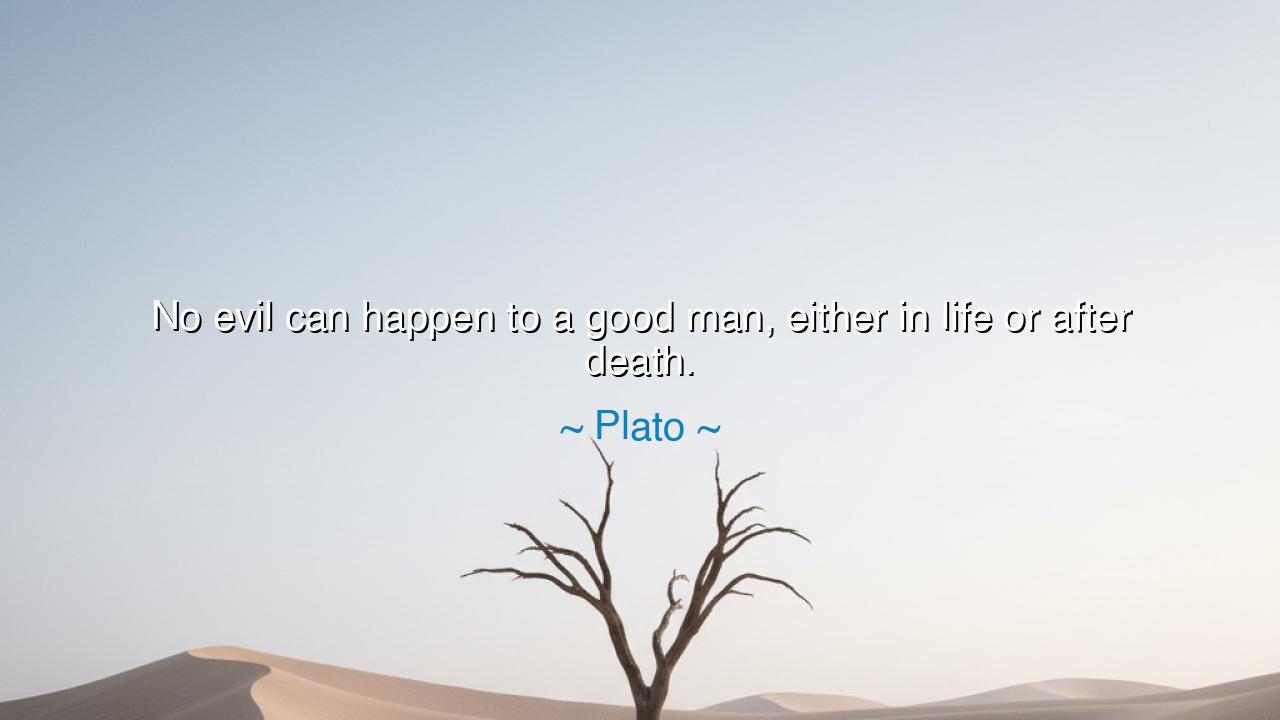
No evil can happen to a good man, either in life or after death.






The words of Plato — “No evil can happen to a good man, either in life or after death.” — echo through the centuries like a calm voice amid the storms of human suffering. In this simple yet profound truth, the great philosopher unveils a vision of goodness so complete, so rooted in the eternal order of the soul, that nothing — neither misfortune, nor betrayal, nor even death itself — can truly harm it. To the ancients, and to us still, these words are both a comfort and a challenge: a comfort, because they promise that virtue is invincible; a challenge, because they demand that we build our lives upon a goodness that no worldly blow can destroy.
To understand the origin of these words, one must return to Plato’s dialogue, “The Apology.” It is there that he places them in the mouth of Socrates, his beloved teacher, as Socrates stands condemned to die. Facing his executioners, Socrates speaks without bitterness, without fear. He declares that no true harm can befall a good person — for the good man’s treasure is not in wealth, reputation, or the body, but in the integrity of his soul. Death, to him, is not an end but a passage. Evil can strike the flesh, but never the spirit that has lived in harmony with truth and justice. These are the words of a man who knew that virtue is immortal, and that the soul at peace with itself stands beyond the reach of fortune’s cruelty.
This teaching, born in ancient Athens, is one of the purest expressions of Stoic and moral philosophy. It tells us that the essence of good and evil lies not in what happens to us, but in how we respond. The world may bring us hardship, but it cannot take from us our character, unless we give it away. A good man — one who acts with wisdom, courage, and compassion — carries within himself a fortress that no tyrant can breach, no misfortune can raze. His peace flows not from circumstance, but from understanding; not from possession, but from alignment with the eternal law of virtue.
Consider the story of Nelson Mandela, imprisoned for twenty-seven years for his defiance against injustice. His body was bound, his freedom stripped, yet his spirit remained unconquered. From the darkness of his cell, he emerged not with hatred, but with forgiveness — not diminished, but transformed. The world had tried to break him, yet found him unbreakable. In this he became the living embodiment of Plato’s truth: no evil can happen to a good man, for the soul anchored in righteousness turns even suffering into strength. Mandela’s torment became his triumph; his captivity, his path to greatness.
So too, in the annals of time, do we find this echoed in the death of Socrates himself. Offered the chance to escape his punishment, he refused, choosing instead to obey the laws of his city, even though they condemned him unjustly. He drank the hemlock calmly, speaking of the immortality of the soul and the goodness of the divine. His body perished, but his virtue did not — and to this day, his example shines brighter than the names of those who condemned him. The Athenians killed the man, but they could not touch the good within him. His death became his victory, his life his eternal testimony to the truth of his own words.
What Plato teaches, through the voice of his master, is that the good man’s power lies in his inner freedom. He does not rely upon the favor of fortune, for he knows fortune is fickle. He does not fear the malice of others, for he knows that evil harms only those who commit it. His joy is not the fragile pleasure of circumstance, but the unshakable serenity of one who walks in harmony with the divine order. To live this way is to live as the philosophers and sages of all ages have lived — centered, calm, and unafraid, knowing that even death is but a doorway to the next unfolding of the soul.
The lesson, then, is both timeless and practical: cultivate goodness within yourself. Let your peace rest not on what others give, but on what you know to be right. Do not seek safety in power, wealth, or fame — for all these are perishable. Instead, seek safety in virtue — in honesty, in compassion, in self-mastery. When you act from integrity, no calamity can undo you; when you live from love, no hatred can destroy you. Even should the world turn against you, you will remain whole.
So remember the wisdom of Plato: that evil cannot harm the good, because goodness itself is eternal. The storms of life will pass, but the soul aligned with truth endures. Be therefore steadfast in your virtue. Guard the temple of your heart. And when trials come — as they must to every mortal — let them find you serene, for you will know, as Socrates knew before you, that though death may claim the body, the good man’s soul remains forever untouched by evil.






AAdministratorAdministrator
Welcome, honored guests. Please leave a comment, we will respond soon